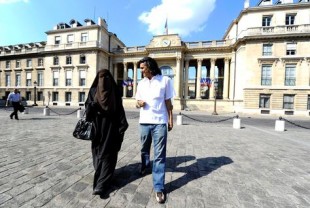

French court hands down first 'burqa ban' fines

A French court fined two Muslim women last week for wearing full-face veils in public, the first time a judge has imposed punishment under a "burqa ban" law that has become a legal and cultural battleground across Europe.
One of the women pledged immediately to appeal to the European Court of Human Rights to overturn the ban, which president Nicolas Sarkozy says protects women and guarantees equality but opponents argue violates human rights and panders to xenophobia.
Only a tiny percentage of French Muslim women wear full-face veils. But the law, which took effect in April, has become a focus of debate in mainly-secular Europe, where right-wing parties hostile to Muslim immigration are gaining support.
The Strasbourg-based European court can consider whether to overturn the French law now that a French court has enforced it. A ruling in Strasbourg could have an impact in other EU countries which are considering similar laws.
"[This] violates European laws. For us the question isn't the amount of the fine but the principle. We can't accept that women are sentenced because they are freely expressing their religious beliefs," Hind Ahmas told reporters outside the court, where she was fined €120 ($162).
"We are going to launch the necessary appeals to bring this before the European Court and obtain the cancellation of this law, which is in any case an illegal law," she said.
A second woman, Najate Naitali, was fined €80 in absentia by the court in the town of Meaux, northeast of Paris.
Ahmas said she would also appeal her sentence in a French court with the backing of French businessman Rachid Nekkaz who has pledged to pay all fines imposed under the ban.
The two women had turned up at Meaux town hall in May wearing veils to offer a birthday cake to Mayor Jean-Francois Cope, who is head of Sarkozy's conservative UMP party and helped push the ban through parliament.
In the five months since the ban came into force, several women were asked by police officers to remove veils and one paid a fine issued on the spot, but no court had enforced the law.
The ban, first of its kind in Europe, makes public wearing of the Arabic-style niqab - which leaves the eyes uncovered - and Afghan-style burqa - which conceals the face behind a cloth mesh - liable to a fine of up to €150 or lessons in French citizenship.
The law has been denounced by Muslims abroad as impinging on religious freedom, but has met only a limited backlash in France, a strictly secular country where fewer than 2,000 women out of a 5 million-strong Muslim community hide their faces.
"I still wear the niqab every day and my life has become hell. I am insulted every day," Ahmas said.